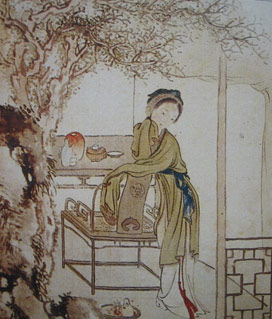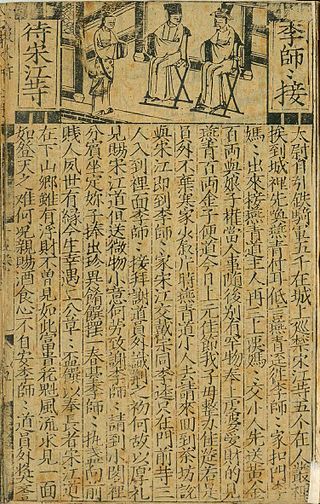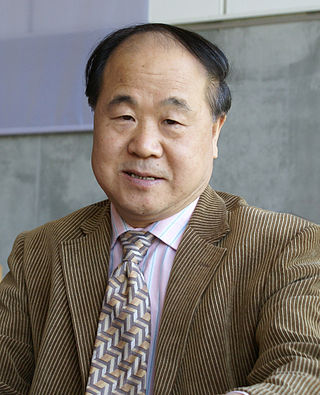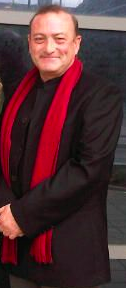The history of Chinese literature extends thousands of years, and begins with the earliest recorded inscriptions, court archives, building to the major works of philosophy and history written during the Axial Age. The Han and Tang dynasties were considered golden ages of poetry, while the Song (960–1279) and Yuan (1271–1368) were notable for their lyrics (ci), essays, dramas, and plays. During the Ming and Qing, mature novels were written in written vernacular Chinese, an evolution from the preeminence of Literary Chinese patterned off the language of the Chinese classics. The introduction of widespread woodblock printing during the Tang and the invention of movable type printing by Bi Sheng (990–1051) during the Song rapidly spread written knowledge throughout China. Around the turn of the 20th century, the author Lu Xun (1881–1936) is considered an influential voice of vernacular Chinese literature.

Gao Xingjian is a Chinese émigré and later French naturalized novelist, playwright, critic, painter, photographer, film director, and translator who in 2000 was awarded the Nobel Prize in Literature "for an oeuvre of universal validity, bitter insights and linguistic ingenuity." He is also a noted translator, screenwriter, stage director, and a celebrated painter.

Journey to the West is a Chinese novel published in the 16th century during the Ming dynasty and attributed to Wu Cheng'en. It is regarded as one of the great Chinese novels, and has been described as arguably the most popular literary work in East Asia. It is widely known in English-speaking countries through Arthur Waley's 1942 abridged translation, Monkey.

Dream of the Red Chamber or The Story of the Stone is an 18th-century Chinese novel authored by Cao Xueqin, considered to be one of the Four Great Classical Novels of Chinese literature. It is known for its psychological scope and its observation of the worldview, aesthetics, lifestyles, and social relations of High Qing China.

Water Margin, also called Outlaws of the Marsh or All Men Are Brothers, is a Chinese novel from the Ming dynasty that is one of the preeminent Classic Chinese Novels. Attributed to Shi Nai'an, Water Margin was one of the earliest Chinese novels written in vernacular Mandarin Chinese.

Buying a Fishing Rod for My Grandfather, also rendered from Chinese as A Fishing Rod for My Grandpa, is a 2004 collection of six short stories by the Chinese writer Gao Xingjian. All of the stories were originally written between 1983 and 1990. The stories were translated to English by Mabel Lee.
Mabel Lee is a translator of the works of Nobel Prize-winning author Gao Xingjian. She has taught Asian studies at the University of Sydney and is one of Australia's leading authorities on Chinese cultural affairs. Lee was a professor of South-East Asian Studies at Sydney University and had already begun translation of the poems of Chinese writer, Yang Lian when she met Gao Xingjian, in Paris in 1991. After that meeting, Lee offered to translate Soul Mountain, a project which took seven years, and an additional two to find a publisher for the book in Australia. Following publication, Gao Xingjian became the first Chinese to win a Nobel Prize in Literature.

Guan Moye, better known by the pen name Mo Yan, is a Chinese novelist and short story writer. Donald Morrison of U.S. news magazine TIME referred to him as "one of the most famous, oft-banned and widely pirated of all Chinese writers", and Jim Leach called him the Chinese answer to Franz Kafka or Joseph Heller. He is best known to Western readers for his 1986 novel Red Sorghum, the first two parts of which were adapted into the Golden Bear-winning film Red Sorghum (1988).

Gregory B. Lee is an academic, author, and broadcaster. Lee is Founding Professor of Chinese Studies at the University of St Andrews. He was until July 2020, Director of the French research Institute for Transtextual and Transcultural Studies based at Jean Moulin University Lyon 3. Lee was previously Chair Professor of Chinese and Transcultural Studies and Dean of the College of Liberal Arts and Social Sciences at the City University of Hong Kong. From 2007 to 2010 Lee was First Vice-President (Research) of Jean Moulin University Lyon 3. In 2010, Lee was made a Chevalier (Knight) in the French Order of Academic Palms. In 2011, he was elected Fellow of the Hong Kong Academy of the Humanities.

Josephine Riley is a British writer, translator, theatre actor, and schoolteacher. Dr. Riley has written and translated several books about theatre arts, especially Chinese theatre. She currently teaches film and drama at Munich International School in Germany.
Shi Tiesheng was a Chinese novelist, known for his story which was the basis of the film Life on a String. The China Daily stated regarding his essay about the park near where he lived, "Many critics have considered I and the Temple of Earth as one of the best Chinese prose essays of the 20th century."
One Man's Bible is a novel by Gao Xingjian published in 1999 and in English translation in 2003. Set during the Cultural Revolution, the novel stars an alter-ego of Gao who reflects on his previous experiences around the world. Throughout the book, the chapters alternate between the narrator describing his life during and after his time in China during the Cultural Revolution. He describes how he looks for freedom and how to retain that freedom.

The Big Red Book of Modern Chinese Literature: Writings from the Mainland in the Long Twentieth Century is an anthology of Chinese literature edited by Yunte Huang and published in 2016 by W. W. Norton & Company. Huang, a professor of English at the University of California, Santa Barbara, described the book as a "search for the soul of modern China" in the introduction.
"Shanshang de xiaowu" was first published in the 8th issue of Renmin wenxue in August 1985. It is not only Can Xue's masterpiece, but also one of the masterpieces of avant-garde short stories that appeared in the mid-1980s in Chinese literature. It was then reprinted in Taiwan and translated into at least four English versions.
Professor Albert Richard ('Bertie') Davis (1924-1983) was born in Dorking and died in Sydney. The Chair of Oriental Studies at the University of Sydney for over a quarter-century, he was a major figure in the development of Asian Studies in Australia.
Wild Peony Press was a Sydney-based independent press, dedicated to fostering the better understanding of Asian cultures in English-speaking countries. Co-founded by Mabel Lee, Wild Peony Press was active between 1984 and 2009 and their work was hailed as " an important move against cultural parochialism" in Australia. From 1991, University of Hawai'i Press undertook international distribution. Initially publishing language textbooks, Wild Peony later focused on literature and culture, including the University of Sydney East Asian Series and World Literature Series. Wild Peony published literary anthologies, the autobiographies of Mitsuharu Kaneko, Liu Wei-ping and Stanley Hunt, a study of artist Wang Lan, poetry by Ouyang Yu, Zijie Pan and Subhash Jaireth, translations of Arakawa Toyozo, Junko Takamizawa, Jun'ichirō Tanizaki, Nishiwaki Junzaburo, Yi Chung-hwan, Kyunyeo, Xu Xing (writer), Yang Lian, Hong Ying and Zhai Yongming and papers from the conferences of the International Comparative Literature Association. Lee, a translator and friend of Gao Xingjian, used his ink paintings for several of the Wild Peony covers.
The A.R. Davis Memorial Lecture is held annually in commemoration of A.R. Davis, the Professor of Oriental Studies at the University of Sydney and a key figure in post-war Asian Studies in Australia. It is organised by the Australian Society for Asian Humanities and published in the Journal of the Society for Asian Humanities.

The 2012 Nobel Prize in Literature was awarded to the Chinese writer Mo Yan "who with hallucinatory realism merges folk tales, history and the contemporary." He is the second Chinese author to win the prize after the exiled Gao Xingjian.

The 2000 Nobel Prize in Literature was awarded to the Chinese émigré writer Gao Xingjian "for an æuvre of universal validity, bitter insights and linguistic ingenuity, which has opened new paths for the Chinese novel and drama." He is the first Chinese recipient of the prize followed by Mo Yan in 2012.












